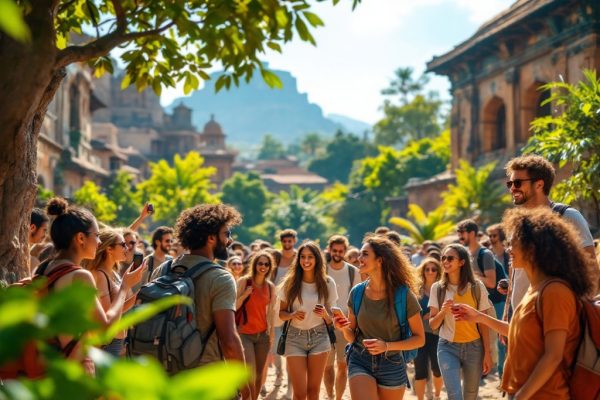Tips for Studying Abroad: All You Need to Know
Ready for an unforgettable adventure abroad? Proper planning is key to a successful and enriching experience. This guide provides essential pre-departure steps, from visa applications and packing lists to managing finances and embracing cultural immersion. Learn how to navigate culture shock, build a support network, and maximize your time overseas. Prepare for a transformative journey by exploring our comprehensive guide today!
Important information

- Attend pre-departure orientations for crucial information on academics, housing, and cultural adjustment.
- Secure your visa and passport: Ensure your passport is valid beyond your program’s end date and obtain the necessary visa well in advance.
- Plan your finances: Create a comprehensive budget, explore funding options (scholarships, grants), and consider opening a local bank account.
- Research housing options: Choose between homestays, student halls, private apartments, or shared housing based on your budget and preferences.
- Prepare for cultural immersion: Learn basic local phrases, research local customs, and be open to new experiences. Engage with the local community.
Pre-Departure Planning
Planning your study abroad experience effectively is crucial for success. Pre-departure orientations are invaluable, offering essential information to help you prepare. Creating a comprehensive packing list is also vital to ensure you have everything you need. Helpful apps, such as translation and navigation tools, can significantly ease your transition into a new environment. Additionally, local information apps provide valuable insights into the area. While technology is beneficial, remember the importance of building personal connections during your time abroad.
Create a Comprehensive Packing List
Clothing
Consider the climate and local customs when choosing your clothing. Pack versatile layers to adapt to changing weather conditions. Try to pack light, but ensure you’re prepared for any eventuality.
Toiletries
Don’t forget essential toiletries like your toothbrush, toothpaste, and shampoo. A small first-aid kit with band-aids and pain relievers is also recommended.
Electronics
Pack necessary electronics such as your phone, laptop, and camera. Remember to bring chargers and any required adapters.
Documents
Your passport and visa are essential. Make copies of these important documents. Pack your travel insurance information as well.
Medications
Pack any essential medications securely and keep them accessible.
Attend Pre-Departure Orientations
Attending pre-departure orientations is crucial for a successful experience abroad. These sessions provide essential information on academics, housing, and cultural adaptation, equipping students to navigate challenges and maximize their time overseas. Through this preparation, students gain insights into local customs and academic expectations, enabling them to thrive in their new environment. Attending the orientation is a worthwhile investment in a rewarding experience. Skipping these sessions can hinder adjustment and lessen the overall experience.
Download Useful Communication Apps
Stay connected with messaging apps that use Wi-Fi for calls and texts, such as:
- WhatsApp,
- Viber,
- Telegram.
Need translations on the go? Download translator apps like:
- Google Translate,
- iTranslate.
For managing finances abroad, use currency converter apps such as:
- XE Currency,
- Currency Converter Plus.
Lastly, for navigating new places without Wi-Fi, use offline map apps like:
- Maps.me,
- CityMaps2Go.
Prepare Your Visa and Other Documents
Ensure your passport’s validity extends beyond your program’s completion. Obtain the appropriate student visa for your chosen country, as requirements vary.
Begin your visa application process well in advance. Collect important documents such as acceptance letters, proof of financial resources, and passport-sized photos. Prepare for a potential visa interview.
Make copies of all crucial documents, including your passport, visa, and acceptance letters. Securely store these copies both physically and digitally, keeping them organized and readily available.
Passport and Visa Requirements
Ensure your passport’s validity extends beyond the duration of your study abroad program. This is crucial for a smooth experience.
Obtain the necessary visa for your chosen country. Contact the country’s embassy or consulate for specific visa requirements.
Start the visa application process early. Avoid last-minute delays by contacting the embassy or consulate well in advance.
Student Visa Process
Research the specific student visa requirements of your chosen country. You can typically find this information on the embassy or consulate website.
Compile all essential documents. These typically include academic transcripts, acceptance letters from your chosen university, and proof of financial resources.
Accurately complete the visa application form. Be prepared to attend interviews, usually conducted at the embassy or consulate.
Pay the required visa application fee.
Exercise patience throughout the process, as visa processing times can vary and may take a considerable amount of time.
Organize Important Paperwork
Designate a secure folder for essential documents.
Copy your passport, visa, and acceptance letter, along with any other crucial paperwork.
Maintain secure physical and digital copies of these important items.
Set a Budget and Manage Finances
Studying abroad requires careful financial planning. Consider these crucial steps:
Estimate essential expenses. Calculate the cost of tuition, housing, meals, and travel. Factor in additional expenses such as books, entertainment, and personal items.
Create a comprehensive budget. Develop a detailed budget encompassing all anticipated costs. This will help you track your spending and stay within your financial limits.
Explore funding options. Research scholarships, grants, and other financial aid opportunities specifically designed for study abroad experiences. Check with your home institution, government agencies, and private organizations.
Consider additional funding sources. Evaluate options such as student loans, personal savings, and financial aid from your home institution. Determine the best combination of resources to fund your studies.
Open a local bank account. A bank account in your host country simplifies access to funds and minimizes transaction fees. It also provides a convenient way to manage your finances while abroad.
Track your expenditures. Monitor your spending diligently. Use budgeting apps or spreadsheets to stay within your budget and avoid overspending.
Prepare for unforeseen expenses. Establish an emergency fund or ensure access to a credit card for unexpected costs. This will provide a financial safety net in case of emergencies.
Research cost of living. Thoroughly investigate your host country’s cost of living, including accommodation, food, transportation, books, and entertainment. This will help you create a realistic budget.
Use an international debit card. An international debit card with minimal or no foreign transaction fees offers convenient access to funds and reduces currency exchange expenses.
Seek out scholarships and grants. Scholarships and grants can significantly offset program costs. Seek out those tailored to study abroad programs.
Budget Planning for Study Abroad
Financial planning is crucial for a successful study abroad experience. Develop a comprehensive budget that includes tuition, accommodation, food, transportation, and leisure activities. Research the cost of living in your chosen city and explore international student scholarships to potentially reduce expenses.
Managing Finances
Opening a local bank account minimizes transaction fees. Diligently track your expenditures, perhaps using a budgeting app. Maintain an emergency fund for unexpected costs.
Working While Studying
Part-time work can supplement your finances. However, verify visa regulations regarding work permits before seeking employment.
Apply for Study Abroad Scholarships and Grants
Studying abroad can be costly, but scholarships and grants can significantly reduce expenses. Many scholarships and grants are designed specifically for study abroad programs. Your home institution may also offer financial aid for studying abroad. External organizations also provide additional funding opportunities. Explore and apply for these resources to make your study abroad dreams more affordable.
Use an International Debit Card
Managing your finances while studying abroad is simplified with an international debit card. Start saving early to maximize the benefits of this convenient tool.
Secure Housing Options
Immerse yourself in the local culture by living with a host family. This option offers a unique cultural immersion experience.
For independent living, a private apartment is ideal. This provides maximum privacy and freedom.
Student halls offer on-campus convenience and a vibrant social scene. This is perfect for meeting new people and easy access to campus facilities.
Shared housing provides a budget-friendly alternative. This allows for more affordable accommodation while still enjoying some independence.
When deciding, consider your budget, desired proximity to campus, and preferred level of independence.
Homestay Arrangements
Experience cultural immersion by living with a local family. Homestays offer firsthand exposure to customs and traditions, along with daily language practice. Meals are often included, simplifying meal planning. Costs vary based on location and amenities. When selecting a program, consider these factors:
- location,
- family makeup,
- house rules (such as pets).
Communicating your expectations and dietary needs beforehand ensures a comfortable and enjoyable stay.
Student Halls and Private Apartments
Student Halls
Student halls offer furnished rooms and shared kitchens and bathrooms, often fostering a strong sense of community within a university setting. They cater to students seeking a social environment.
Private Apartments
Private apartments provide more independence and privacy, but may require furnishing and setting up utilities. They cater to students who value personal space and autonomy.
Both options cater to students, yet costs and amenities differ significantly. Researching locations, amenities, and costs is crucial for selecting the right accommodation.
Shared Housing Considerations
Sharing a house offers financial advantages, such as splitting the cost of rent, utilities, and other expenses, which significantly reduces the individual burden. This can be especially beneficial for students who are often on a tight budget.
Sharing a house also offers social advantages. Living with roommates provides a built-in support network. This can ease the transition to a new environment, particularly for students moving away from home for the first time.
However, shared living requires compromise and clear communication. Establishing house rules and expectations is key to a harmonious living experience.
Purchase Plane Tickets
Grab the best flight deals by booking your international trips 2-3 months in advance, which can lead to significant savings. Being flexible with your travel dates also helps; consider flying mid-week or during the off-season for cheaper fares. Don’t forget to compare prices across various airlines using online comparison websites.
Travel insurance is essential, protecting you from unexpected problems like medical emergencies, trip cancellations, or lost luggage. Since coverage varies greatly, comparing policies is crucial. Find one that fits your budget and needs, considering your trip’s length, destination, and planned activities, all of which affect your ideal coverage.
Best Time to Book Flights
Booking flights in advance can save you money. For international travel, aim for 2-3 months prior to your departure date to secure the best deals. For domestic travel, booking 1-3 months ahead is usually sufficient.
Travel Insurance Considerations
Travel insurance protects your finances and trip by covering unforeseen problems like trip cancellations, medical emergencies abroad, and lost luggage. It’s especially important for students studying overseas. Policies differ, so compare coverage to find the best fit for your trip and destination. Some countries may require specific coverage. Your health and planned activities should also influence your decision. Choosing the right travel insurance provides essential peace of mind.
Health and Safety Preparations
Schedule a pre-trip checkup with your doctor.
Obtain international travel health insurance.
Research nearby hospitals and clinics at your destination.
Ensure you have all necessary vaccinations and medications.
Visit Your Physician for Health Clearance
Before embarking on your study abroad program, schedule a pre-trip checkup with your doctor. This crucial visit will ensure you’re healthy enough for travel and ready to adapt to a new environment. Your physician will assess your current health status, update necessary vaccinations, and provide any required prescriptions. They’ll also discuss potential health concerns specific to your destination, preparing you for a safe and healthy experience abroad.
Health Insurance and Travel Insurance
Health Insurance
Your health insurance might cover medical costs abroad, such as routine checkups and emergencies. However, confirm the extent of your health insurance’s international coverage. If it’s limited, consider a dedicated international health plan.
Travel Insurance
Travel insurance offers more comprehensive protection. It covers trip cancellations, lost luggage, emergency evacuations, and medical expenses. It’s highly recommended to get travel insurance to protect yourself from unexpected problems during your travels.
Understanding the details of both health and travel insurance policies will ensure you’re fully protected on your trip.
Brush Up on Language Skills
Mobile language learning apps like Duolingo and Babbel make studying incredibly convenient. Formal language courses, often available at local colleges and community centers, provide structured learning.
Starting with basic greetings, common phrases, and simple questions demonstrates respect and facilitates easier interactions with native speakers.
Connecting with native speakers through language exchange programs or conversation partners is another effective method. Cultural immersion also plays a key role; explore books, music, and films in your target language.
Language Learning Tools and Resources
Language learning apps are a fantastic way to acquire new language skills. Popular choices like Duolingo, Babbel, and Memrise offer interactive lessons and personalized feedback, promoting effective learning. For those looking to improve their speaking skills, online language exchange platforms connect learners with native speakers. These communities provide invaluable conversational practice, accelerating fluency development. Translation apps and dictionaries are also beneficial. They facilitate comprehension of both written and spoken language, making navigating unfamiliar languages easier. Podcasts and audiobooks offer immersive practice. Listening during commutes or downtime provides a convenient way to enhance language proficiency. Here are some helpful resources for language learners:
Language Learning Apps
- Duolingo: Offers gamified lessons and personalized feedback.
- Babbel: Focuses on practical vocabulary and grammar.
- Memrise: Uses flashcards and spaced repetition to enhance memorization.
Other Resources
- Online language exchange platforms: Connect learners with native speakers for conversational practice.
- Translation apps and dictionaries: Facilitate comprehension of written and spoken language.
- Podcasts and audiobooks: Provide immersive listening practice for language proficiency.
Local Language and Cultural Immersion
Learn basic local phrases. Picking up a few everyday expressions can significantly enhance your daily interactions and help you connect with people on a deeper level.
Immerse yourself in community events and festivals. Participating in local events offers a unique glimpse into the heart of your host country’s culture and creates lasting memories.
Engage with local customs and traditions. This broadens your understanding and provides a powerful learning experience, fostering personal growth.
Build relationships with locals. Connecting with people in your new community not only creates lasting memories but also enriches your experience abroad.
Research cultural norms. Before you go, learn about greetings, dining etiquette, and other cultural norms to demonstrate respect and avoid misunderstandings.
Research Local Laws and Cultural Etiquette
Planning to study abroad? Researching local laws and customs is key to a successful and enriching experience. Understanding cultural norms helps students integrate smoothly, minimizing misunderstandings and fostering positive interactions with their new community. For instance, knowing local etiquette demonstrates respect, which not only enhances learning but also builds valuable relationships with locals. Ignoring customs can create unnecessary difficulties. Therefore, prepare in advance by learning the local ways and make the most of your international experience.
Research laws and customs. Begin by thoroughly researching the laws and customs of your host country.
Understand cultural norms. Focus on understanding the cultural norms, including etiquette, greetings, and social interactions.
Learn local etiquette. Knowing local etiquette demonstrates respect and helps build positive relationships.
Prepare in advance. Prepare in advance by learning the local ways to make the most of your international experience.
Understanding Cultural Values and Norms
Before embarking on your journey, take some time to discover your destination. Researching local customs and traditions is key to understanding social norms. Learning basic phrases not only demonstrates respect but also facilitates communication. Embrace an open-minded and adaptable approach, as cultural differences are unavoidable. A positive attitude will help you navigate misunderstandings and appreciate the nuances of a new culture. Engaging with local communities and participating in cultural events will deepen your understanding and enrich your travel experience. Here’s how to make the most of your cultural immersion:
Research your destination. Delve into the local customs and traditions to grasp social norms and expectations.
Learn basic phrases. Demonstrating respect through language can significantly enhance communication and foster positive interactions.
Be open-minded and adaptable. Cultural differences are inevitable, and embracing them with a positive attitude allows for a richer experience.
Engage with local communities. Participating in cultural events provides firsthand exposure and deepens your understanding of the local way of life.
Avoiding Cultural Misunderstandings
Before embarking on your travels, research your destination’s customs and traditions. Understanding local social norms is crucial for a positive experience. Learning basic phrases in the local language can significantly enhance your interactions. Cultivate an open mind and embrace adaptability, as these qualities are essential when navigating unfamiliar situations. Engaging with local communities offers invaluable learning opportunities, and participating in cultural activities allows for a truly immersive experience.
Research the local customs and traditions. Understanding social norms is crucial for a respectful and enriching travel experience.
Learn basic phrases in the local language. Even a few words can go a long way in building rapport and showing respect.
Cultivate an open mind and be adaptable. Unforeseen situations are part of the travel experience. Embrace them with flexibility and a positive attitude.
Engage with local communities. Interacting with locals provides unique insights and creates memorable connections.
Participate in cultural activities. Immerse yourself in the local culture by attending events, trying traditional foods, or visiting historical sites.
Mental and Emotional Preparation
Preparing mentally and emotionally is key for a successful study abroad experience. Culture shock, a common hurdle, often leads to disorientation, confusion, and anxiety. Researchers describe a four-stage process: honeymoon, frustration, adjustment, and acceptance. Homesickness is another challenge, but staying connected with loved ones can help. Building a support network in your new environment is also crucial.
Combating Homesickness
Maintain regular contact with family and friends back home through calls, video chats, or emails. Share your experiences and stay updated on their lives to feel connected.
Building a Support Network
Join student clubs or societies based on your interests. Participate in social events organized by your university or local community groups. Engage with the local community through volunteering or language exchange programs.
Connecting with other international students creates a valuable shared understanding and support system. This connection enriches the experience for everyone involved.
Coping with Culture Shock
Immerse yourself in the local culture. Connecting with locals and other international students can significantly ease your transition.
Participate in community events and explore your new neighborhood. These activities provide invaluable cultural experiences.
Cultivate patience and open-mindedness. Cultural adaptation is a process that requires time.
Establish a daily routine. This fosters stability and helps build a sense of belonging in your new environment.
Utilize available support systems. Reach out to fellow students, advisors, or counseling services for guidance and support when needed.
Dealing with Homesickness
Staying connected with family and friends through video calls, messaging, and social media can help combat homesickness. Joining student clubs and organizations is a great way to meet new people and build a support system. Exploring the local culture will further enrich your experience by immersing you in your new surroundings.
Expand Your Social Circle
Connecting with locals is crucial for adapting to a new country. Building relationships provides invaluable insights into the local culture, customs, and traditions. Befriending local students, for instance, offers a great opportunity to improve language skills and exchange cultural knowledge. Joining clubs based on your interests can also expand your social circle and connect you with like-minded individuals.
Maximizing the Experience Abroad
Staying connected with family and friends back home is essential. Exploring your new surroundings, both near and far, is crucial, as travel is a powerful tool for personal growth. Documenting your experiences through journaling or blogging helps reflect on your journey. While academic pursuits are important, embracing cultural exploration and personal development contributes to a well-rounded experience. Find a balance that works for you.
Maintain Connection with Loved Ones
Staying connected with family and friends is essential during your time abroad, offering crucial emotional support. Leverage video calls, messaging apps, and social media platforms to easily stay in touch. Scheduling regular check-ins ensures consistent communication, allowing you to share experiences and updates, keeping loved ones involved in your journey. Be mindful of time zone differences when planning calls or sending a quick message to bridge the distance.
Explore Travel Opportunities and New Adventures
Expand your horizons by exploring charming towns near your host city and experiencing local festivals. Immerse yourself in the culture by discovering historical landmarks and museums, gaining insights into the region’s rich past. Join study abroad excursions to connect with new people and create lasting memories. Embrace the outdoors with unforgettable adventures like hiking scenic trails, kayaking, and exploring breathtaking national parks. If your budget allows, consider weekend trips to nearby countries. Be open to spontaneous experiences and engage with the local culture to maximize your time abroad.
Cultural Immersion
- Explore charming neighboring towns and experience local festivals.
- Discover historical landmarks and museums.
- Engage with the local culture.
Adventure and Exploration
- Hike scenic trails and explore breathtaking national parks.
- Embrace outdoor activities such as kayaking.
- Consider weekend trips to nearby countries if budget permits.
Social Connections
- Join study abroad excursions and connect with new people.
Embrace Spontaneity
- Be open to spontaneous experiences and create lasting memories.
Documenting Experiences for Personal Growth
Documenting your experiences is a powerful tool for self-reflection and personal growth. Whether you choose journaling, blogging, or creating videos, these methods help you process life events and observe your own development. Over time, you’ll identify challenges and recognize successes, leading to a deeper understanding of yourself and the world. Furthermore, capturing your experiences creates lasting memories you can share, connecting with others through your unique stories.













